#though the order of events it describes is more metaphorical
Explore tagged Tumblr posts
Text
i think geometry dash's ‘not technically a rhythm game’-ness leaves some more room for conceptual difficulty as well, prioritizing the game taking place in a 2D space rather than just directly mapping input windows to judgements. some levels play into the availability of practice mode by making you come up with the correct path through the level before executing it (e.g. parts of Sculptures by flash, VEIL by neigefeu [includes full screen flashes]). i'd also like to highlight False Horizon by lumpy, which has a clearer path but encourages you to both look ahead and at what's happening directly around the player to get through some segments, and uses some gameplay elements solely to psyche you out.
however, i think you're right for the average level. the only difference between the same tap pattern played on different combinations of mechanics is that how the player moves can map to important motion in the song while not taking up much space on the screen, something not really relevant for playing.
and, while i'm not good enough to engage with anything near the top difficulty, i'm under the impression that most interesting things do indeed get subsumed by muscle memory timings eventually. there's some opportunity to specialize into the flying gamemodes (ship and wave) because those rely more on managing your position within the allotted area that doesn't kill you, and there are levels that play with tech and weird timings (e.g. Sunset Sandstorm by crohn44, chancla by heatherhayes) but it matters a lot less than in other games because as you mentioned there's only one input, so it's just clicking with different visual indicators at a difficulty level where some people play with the music off because it's not a precise enough guide to time their jumps.
i havent played geometry dash but from what i can tell its a 1 button rhythm game (not technically a rhythm game but it's often treated like one so w/e) with rules & an editor that allowed its users to make arbitrarily tight timing windows and not much room for input density so the tightness of the timing windows became basically the only axis upon which the difficulty could vary which left a vacuum of design/expression that was filled entirely with the craft of making the levels look really really cool.
#can't speak for the people with opposing views in the most popular reblog of this#because they could come from any of however many different areas that focus on different aspects of the game#so hopefully this helps give some examples in that regard#(and yes they do argue with each other to no end)#one paragraph of disagreement followed by two qualifying it#because imo the original post is mostly correct#though the order of events it describes is more metaphorical#but that part's not very relevant to how the game is used today#there's a reason there's not a similarly-sized scene for storyboarding in osu
460 notes
·
View notes
Text
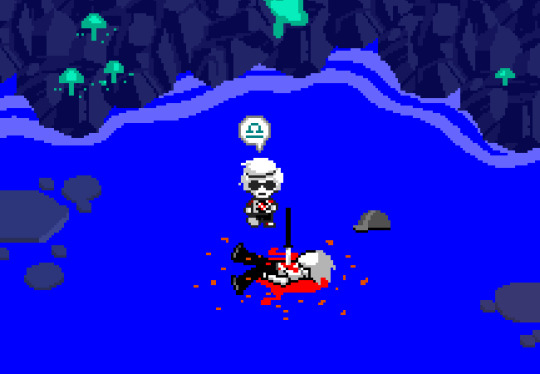
I guess everyone is reacting to their parents' deaths in this arc. Dave's relationship with Bro has always been a little... complicated, so this should be a very interesting conversation.
TG: oh my fucking god […] TG: we just got done talking and agreed it would be awesome if you didnt bother me for a while […] GC: OH GC: TH4TS R1GHT GC: 1 FORGOT! TG: it was five seconds ago
Girl, get your damn timelines in order!
GC: D1D YOU LOV3 H1M D4V3? TG: no
I believe you.
There's something about the Strider brothers which I noticed a while ago, but haven't had the opportunity to talk about. This is the perfect moment to discuss it, though, because it explains a lot about why Dave is the way he is.
So - let's talk about the Strife fights.
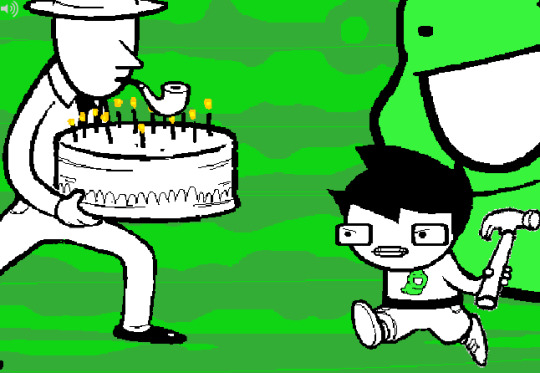
When John first attacked his father with a hammer, I decided to roll with the assumption that this fight was symbolic, rather than literal. John loves his dad, and it can be safely assumed that he doesn't want to kill the guy.
Instead, this scene serves as a stand in for the familial strife between father and son. John finds his father's parenting style to be mildly frustrating, and their interactions sometimes feel like a fight to him.
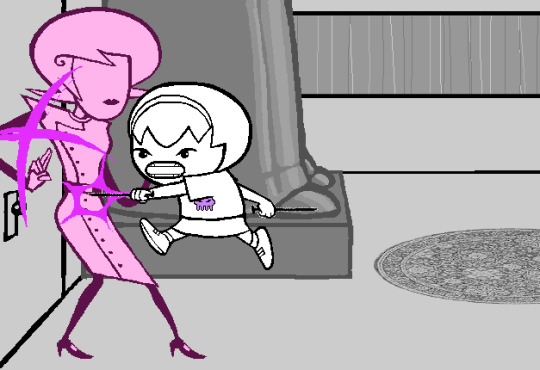
Likewise, Rose (probably) isn’t actually going for Mom with those needles. Instead, their fight represents Mom’s 'ironic' negligence, and the gifts that Rose refuses to believe are from the heart. The Lalonde relationship is clearly more fraught than the Egbert one, but I don't think Rose actually wants to skewer Ms Lalonde.
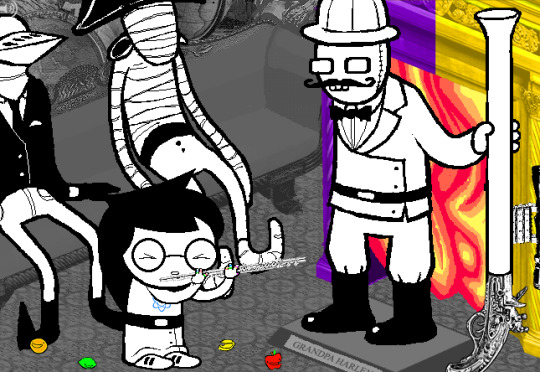
Jade doesn't really fight her Grandpa, but their Strife clearly demonstrated how deeply in-denial she is - not about his death, but about the fact that her life isn't normal. She's desperately trying to have the same childhood that John and Rose are describing, but she can't, because she doesn't have a parent to bicker with.
Now, I'm sure you've guessed where I'm going with this. What, exactly, did Dave's Strife scenes represent?
Well...

...first of all, it's worth noting that Dave is the only Player to explicitly describe the events of his Strife to a third party. We've never heard John reminiscing about bludgeoning Dad, but Dave's constantly complaining about getting beaten up by puppets.
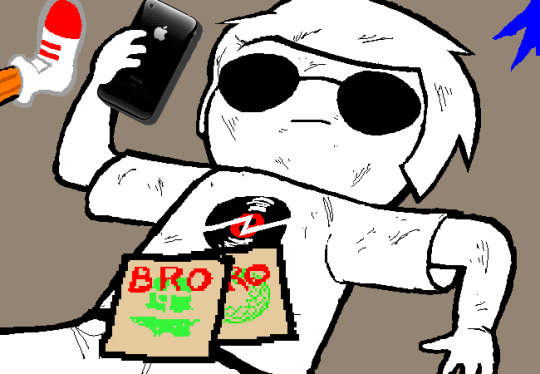
And - rather more worryingly - Dave is the only Player to retain his Strife injuries, even after this ostensibly 'metaphorical' fight is over.
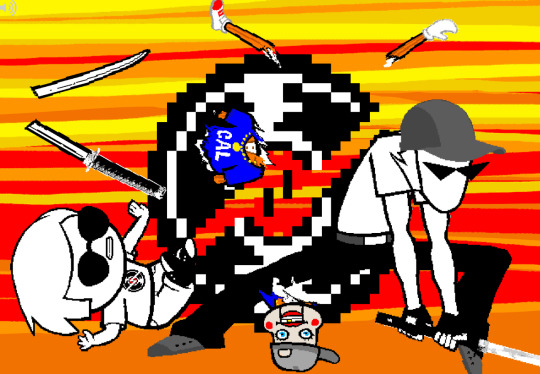
In fact, one of those Strife injuries still marks him to this day.
The point I am obviously dancing around is that I don't think Dave's Strife was a metaphor at all. Unlike his friends, there's no pretense to these fights. They're literal. Dave's brother routinely attacked him.
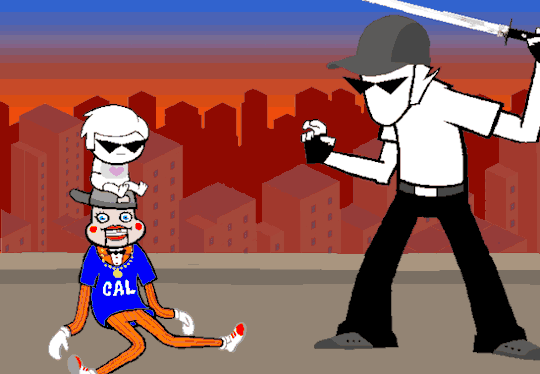
Odds are, this was Bro's way of 'preparing' Dave for the game he surely knew was coming - but you don't need me to tell you that he took it way too far. The guy might have been Dave's assigned Guardian, but he really shouldn't have been raising anyone.
#homestuck liveblog#full liveblog#act 5.2#s148#3697#plus (as demonstrated above) Bro was pulling shit like this outside of strife as well. that baby scene was from terezi's POV
286 notes
·
View notes
Text
I can't stop thinking about it so... Here's an analysis of why i believe David Bowie's "space oddity" may have been taken as inspiration for the game Mouthwashing.
So, i feel like even though it could fit the game as a whole as well, this song best describes Curly, and his mental state throughout the game. If you've never listened to the song before, I'd suggest doing so before reading this. Not necessarily because you wouldn't understand it otherwise, but because it fucking slaps. The lyrics are in order, but the game events might not be chronological because of that. Some of the lyrics will have much more in-depth descriptions than others.
The song starts off by repeating the lyric "Ground control to major Tom... Ground control to major Tom..." In this scenario, i picture Curly as major Tom and, unsurprisingly, Anya as ground control. I do think other characters fit the role of "ground control" at points, but it's mostly Anya. Anya is warning Curly about Jimmy, and the lyric repeating relates to how her pleads for help remain unheard pre-crash.
"this it ground control to major Tom, you've really made the grade, and the papers want to know who's shirts you wear." This lyric feels very connected to Curly's success as a pilot. In this lyric i picture ground control as either Pony Express, communicating through the letter from corporate stating his promotion, or Jimmy and his envy/inferiority complex towards curly. Depending on the perspective, it could be taken as either sincere or sarcastic.
"now it's time to leave the capsule if you dare" I don't have a perfect connection for this one as it is just an extension of the previous lyric, but it could relate to the idea of Jimmy feeling like he's being abandoned by Curly, the capsule in this scenario being Jimmy and the crew. Sort of like he's saying "fine, leave me, i dare you."
"this is major Tom to ground control, I'm stepping through the door, and I'm floating in the most peculiar way. And the stars look very different today" was a bit of a tricky one but I'm thinking it has to do with the hallucinations/psychotic episode he experienced right before Jimmy's psych eval. Sort of like how the minute he stepped out of the door, he started seeing things.
"for here, am i sitting in a tin can, far above the world" seems indicative of how curly feels trapped (like being in a tin can,) both on the ship and in his job/life. The lyric is repeated multiple times throughout the song, and although the meaning changes each time, the overarching theme of feeling trapped seems present in each of them.
"planet earth is blue, and there's nothing i can do." is definitely connected to Curly's helplessness through it all. His inability to help anya, or to stop the crash, or to do much of anything after the crash due to his injuries. There's nothing he can do about what's happening, no matter how badly he wants to fix it.
"though I'm past one hundred thousand miles, I'm feeling very still." this could be another example of Curly feeling trapped in his position. He's exceeded or met his goals, yet still feels empty about it. It took him so long to get here, yet he's gained very little from it, and just wants to escape.
"and i think my spaceship knows which way to go." i think this represents Curly's misplaced trust in Jimmy before the crash and how Jimmy was supposed to be steering the ship.
"tell my wife i love her very much, she knows." in this scenario i picture anya as the "wife" and him saying "i love her" as him apologizing. It represents how he sees his mistakes and wants to apologize.
"ground control to major tom, your circuit's dead, there's something wrong, can you hear me major Tom? Can you hear me major Tom?" Ok this is my absolute favorite one, because it's literally the dead pixel metaphor rephrased. Once again, ground control is Anya and major Tom is curly. Anya is trying to tell Curly about the "circuit" or the dead pixel, referring to Jimmy, and the lyrics after, asking "can you hear me major tom" is sort of like how she wasn't able to get through to him either about Jimmy or the pixel.
and the final lyric. "Here am i floating round my tin can, far above the moon. Planet earth is blue, and there's nothing i can do." This is a representation of Curly's acceptance. The tin can could be either the ship as a whole or the cryopod. "Planet earth is blue and there's nothing i can do" is no longer regret, it is now a statement of mourning, for his crew and likely for himself as well.
I tried my best with this, guys. I'm not an analysis person so again, this could be really terrible and I'd have no clue! But if you made it this far, i hope you see my vision at least a little bit.
(@verdantwyrm come get yr juice 😋)
#mouthwashing#song analysis#story analysis#anya mouthwashing#curly mouthwashing#jimmy mouthwashing#mouthwashing game#mouthwashing analysis#david bowie#space oddity
31 notes
·
View notes
Text
Mahoro, Matakara, Aladdin and the Princess
I think Episode 8 finally confirmed to me that the role of the Princess in the Aladdin allusion was actually split between Mahoro and Matakara, rather than it being one or the other. There's a reason why they're both represented by Jasmine-chan during the Nyan Nyaight Love cutaways!
Preface; imo Bucchigiri's narrative takes inspiration from both Disney's Aladdin and the original Aladdin story, so I'm going to switch the Princess's name depending on which version of her I'm referring to. So Jasmine -> Disney's Aladdin, and Badroulbadour -> 1001 Nights Aladdin.
From what I saw in the 1001 Nights Aladdin, Badroulbadour didn't have much of a personality, so it makes sense that a lot of Mahoro and Matakara's personalities were taken from Jasmine, while their roles in the story were slightly more influenced by Badroulbadour.
Mahoro: The feistier side of Jasmine. She has a sharp tongue and always speaks her mind, regardless of potential danger. Eg. Mahoro stands up to Akutaro after he gains the upper hand on both gangs, similarly to how Jasmine refuses to bow to Jafar when he becomes Sultan.
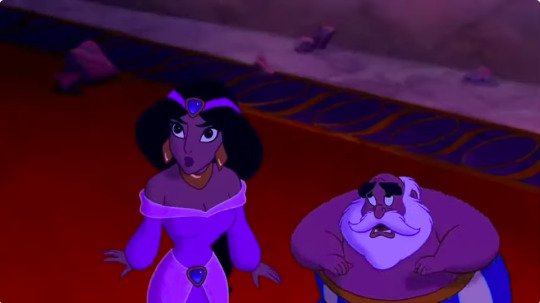
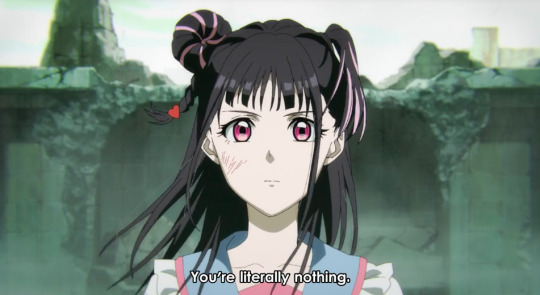
She's also regarded as pretty desirable, and has charmed several men to get them to do what she wants (something that both Jasmine and Badroulbadour do at some point to trick Jafar/the sorcerer). Arajin falls for Mahoro at first sight, similarly to how both versions of Aladdin fell for both versions of the Princess, and like Aladdin his crush on her becomes his driving motivation throughout the series. Akutaro also talks about turning her into a NG Girl and…abusing her, a la Jafar. Ik it's just to trigger Arajin but yk what I mean!
Matakara: The gentler, more naive side of Jasmine, in that he trusts/believes in Arajin...a lot more than he should, really. The main 'lying' plot point between Disney's Aladdin and Jasmine is directly implemented into Matakara and Arajin's relationship. On a surface level there's also their blue colour schemes and phonetically similar names (Asamine -> Jasmine). Near the climax of the 1001 Nights version, the sorcerer tricks Badroulbadour into giving him the lamp with the genie in it, similarly to how Akutaro manipulates Matakara into shooting himself with Ichiya. Both actions trigger a Very Bad Turn of Events that Aladdin stops/will have to stop with the help of his own genie.
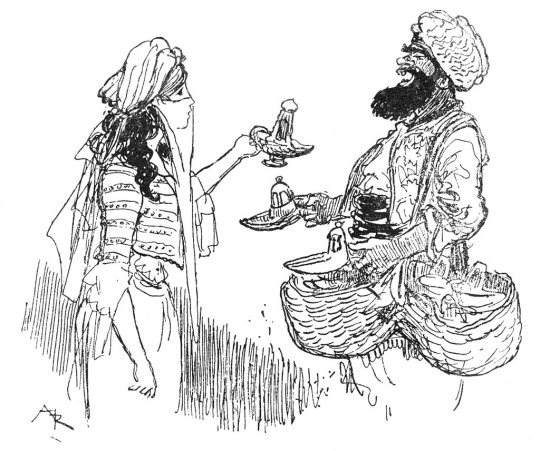
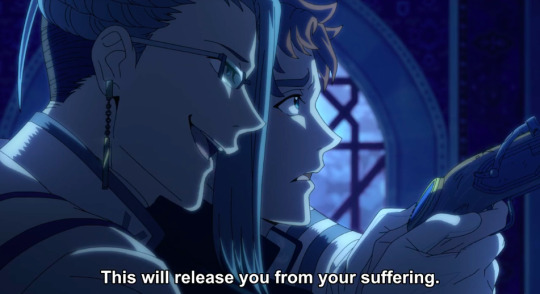
Also very interesting how Ichiya has a moon motif, and Badroulbadour's name is a metaphor for female beauty meaning 'full moon of full moons'. Totally not losing my fucking mind over that no sir
Though they both fit the Princess allusion, the entire show is screaming that Matakara is Arajin's true Jasmine, and Arajin is going to realise he was what he needed all along. Honestly, it doesn't get more obvious than Episode 9.
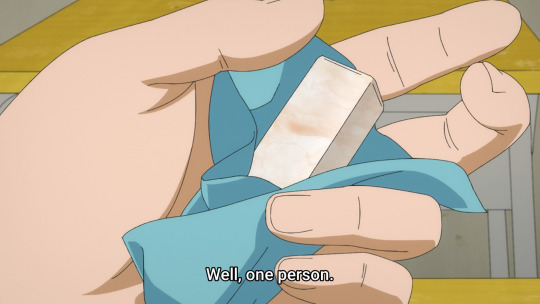
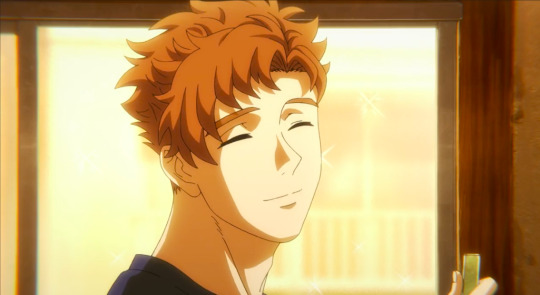
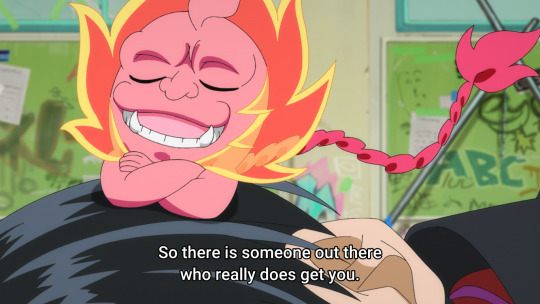
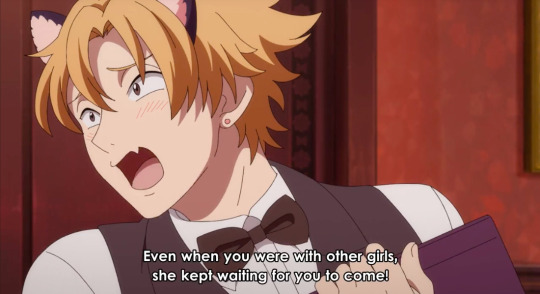
That's not to mention how Mahoro and Matakara also have many, many parallels to each other via their relationships with Arajin. (Both visit him one-on-one at his mom's restaurant to convince him to do something and order the exact same dish, Arajin thinks of child Matakara after seeing both current Matakara and Mahoro get hurt, his meetings with both of them are juxtaposed with one another and described as a 'fated meeting' in this trailer, etc.)
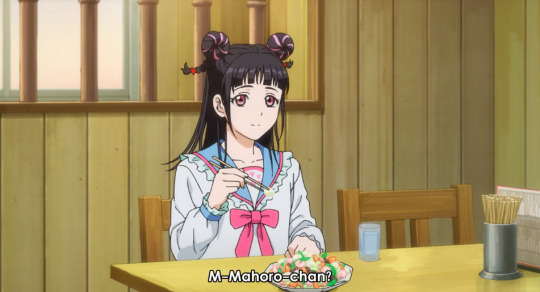
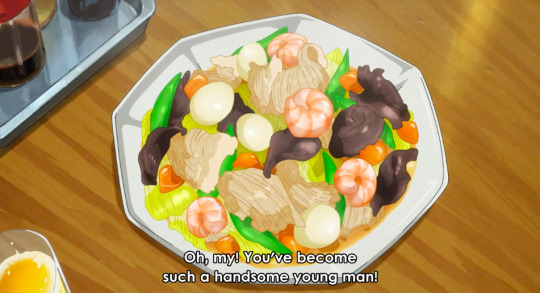
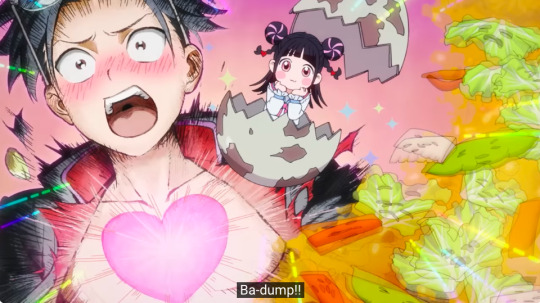
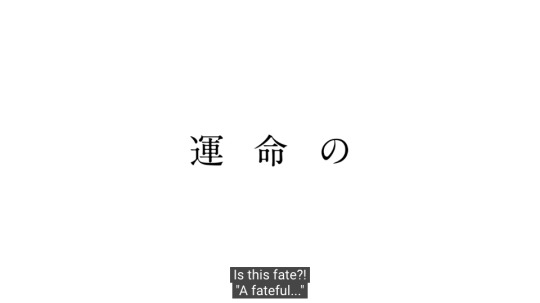
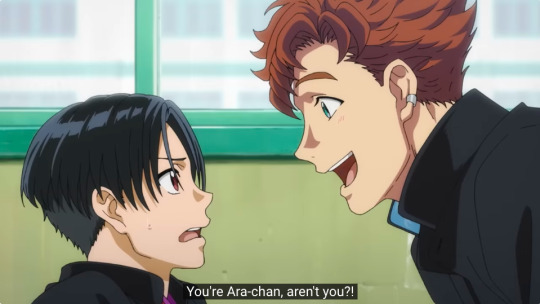
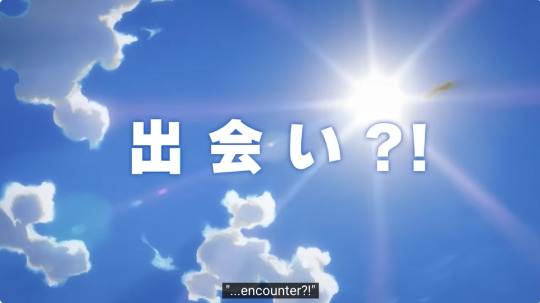
Aside from that, there's also a lot of little stuff that the two have in common! (Both suck at cooking, both deeply care about their older siblings, both are cute as hell etc etc.)
(it's also pretty neat how they're technically both the respective 'princesses' of Minato Kai and Siguma, being the younger siblings of the leader/former leader of each gang!)
#bucchigiri?!#mahoro jin#matakara asamine#arajin tomoshibi#crafty speaks#you know the yaoi is good when i start to use normal grammar#gotta stop the princess talk before i make this about utena again#anywaysss here's hoping matakara and mahoro become besties and bond over their abysmal taste in men <33
81 notes
·
View notes
Note
So how does Messmer's story interact with a theme of autonomy?
OMG FUCKING FLAPPING MY HANDS SO HARD AT THIS ASK GLAD YOU FUCKING ASKED ANON 💞✨💞✨💞✨
Okay, sorry it took me one grillion years to get this posted, but it is basically an essay and I also have Many Life Events that prevent me from getting a chance to sit down and write. I have many thoughts. I will put them under a read more.
When I say Messmer’s story is about autonomy, I mean this specifically in relation to disability.
To me, the base serpent functions as an allegory for some sort of disability. We know the base serpent feeds on Messmer’s flame—this is his curse, to have this eldritch thing gnawing at his soul.
Now how is the base serpent treated by those around Messmer? And how does it affect his life? (Answer: negatively)
Let’s start with how the serpent itself functions as an independent agent. For a moment please forget what I said about it being a disability metaphor—it still is but that’s a mystery mouskatool for later. Right now we’re gonna talk about it as a living entity of its own.
As I pointed out, the serpent feeds on Messmer’s flame, and this harm and how intertwined it has become with Messmer’s existence limits Messmer. It has affected his view of himself to the point it limits his choices in life. How to present himself—with or without flame? He associates his flame with the serpent. How to fight—with or without the serpent’s power? It doesn’t seem to hurt him to use the serpent, but it does make others uncomfortable.
The harm itself of the serpent using Messmer as a food source is also a very basic imposition on Messmer’s autonomy. Of course he doesn’t want an eldritch snake gnawing at him like a chew toy, but the serpent is not going to leave him alone. It does not give him his own space and freedom.
Messmer tries to remove his flame not because the flame itself is a curse, but because it attracts something which is. That’s deeply fucking sad. He’s trying to remove parts of himself—to change himself fundamentally—just to get basic freedom and autonomy.
Now let’s also look at how others see the base serpent. For example, Marika.
Listen. She tried her best with him but I do wonder when the grace seal happened. It seems (to me at least, though we have no confirmed timeline) to have been done early in his life given the language used to describe the serpent. This was urgent. Marika was very worried about this wicked serpent and what it was doing to her son! This is important, by the way—that she does these things out of love.
Marika is also, however, deeply concerned with her own ideals. For example, light, the source of her own grace and of Messmer’s power. Messmer seems to scorn those “devoid of light” as he puts it. Darkness in itself is a curse under the Golden Order. Perhaps she wants to save the flame within Messmer for this reason, although there is definitely the motivation of that is her son.
The dual motivations, to both protect someone and to enforce our ideals of what is “best” is what hurts so many disabled folks. Sometimes “normal” is not attainable—and it doesn’t have to be! What disabled people find normal or doable or comfortable is fine, and they should have the agency to say so. That’s where I see autonomy really coming into Messmer’s story as an important motif.
Messmer is unfortunately born into a society that, at least to Marika, seems prejudiced against the strange. He is born into a world that would hate him for having the base serpent (though that is no fault of his own). And instead of trying to change this faulty thinking in others, Marika changes her son.
Her healing is…a mixed bag. The blessings Marika makes for her son seem alright. That’s non-invasive medicine, and it’s not like she’s forcing these down Messmer’s throat. But the grace seal is more iffy. Like I said, I’m not sure how I feel about the grace seal and whether that’s really accommodation. It does send a certain message that, uh, a core part of Messmer deserves to be locked away for eternity, which is not healthy for anyone to hear.
But I can understand why Marika did it, too. She thinks she is healing/accommodating her son and making life livable. And maybe she is! The base serpent we see in the second phase of the fight looks painful. But that is also a manifestation of something that has been repressed for centuries and is boiling over.
I wanna know what the base serpent was like when he was born! Was it truly “wicked?” Did it want to hurt others, or just go after Messmer’s flame? Both? Was the base serpent just something Marika was uncomfortable with, because it took light from her son? How necessary is that light? I wanna know how necessary the grace seal was!
We know Marika had Messmer after her apotheosis—he is a demigod, after all. So at this point she is already being affected by the Greater Will and ideals that will become the Golden Order. I do think Messmer of all her children probably had the least of this Order forced upon him, but that isn’t to say he had none. He was in the Lands Between at some point, based on the fire giants and Impaler’s Catacombs. He did have to conform to some degree to be accepted.
He definitely had to conform to be accepted in Leyndell. People in the Shadow Lands may be accepting—we see Hornsent and no one gives a damn—but the Misbegotten and Omen in the Lands Between (who look a lot like hornsent, mind you)? Treated like absolute shit, because of the Order. There is no way Messmer was escaping such treatment, no matter if he was a demigod.
The grace seal could be accommodation, but it is also a manifestation of Marika’s and the Order’s ideals and the pressure to conform—to give up autonomy for safety (which is really no choice at all).
Above all, what Marika and/or Messmer do to “heal” him does nothing to fix societal prejudice. Nothing here fights for autonomy or freedom. Not the blessings, not the seal—I mean it’s a fucking seal, a lock.
And it only hides the base serpent, instead of actually fighting it, which in the end leads to destruction.
It is not necessarily a kindness to try to treat or cure a disability if you are not also working to undo the prejudice against said disability and provide accommodations. It is not necessarily a kindness to try to cure a disability which doesn’t need curing. And it is no kindness to demand disability be swept under the rug because it is not palatable enough to you.
This is where we see loss of autonomy.
Messmer is such a walking tragedy. He’s just doomed from the start. Marika is trying, but she’s not fixing the world, just continuing its cycles of violence. And even if she didn’t give him the seal, the base serpent would’ve been spurned.
As a last aside/point, I wanna discuss how Messmer deals with his own situation as a disabled person (and more generally a minority class) because it reflects something in the real world.
Messmer accepts the verdict that part of himself should be hidden, and that being what he is is bad, and he goes on to further this notion. He destroys the people his mother wants him to destroy. He commits genocide for many reasons, but one of them is because it guarantees a scrap of power under the Order. He preserves the status quo instead of fighting against it, and he tries to be “one of the good ones” to save himself as much as he can within a system that hates him.
He is someone who is not good enough for the order, and he is lightless, but at least he is denying himself to try to be like the oppressors.
Which gets you nowhere by the way. Being one of the good ones is never enough, and it will destroy you in the end.
#elden ring#messmer the impaler#guys I didn’t fucking edit this#unedited#finally being posted after months#messmer#um. that’s it for tags#milky yaps about disability I suppose#essay tag
33 notes
·
View notes
Text
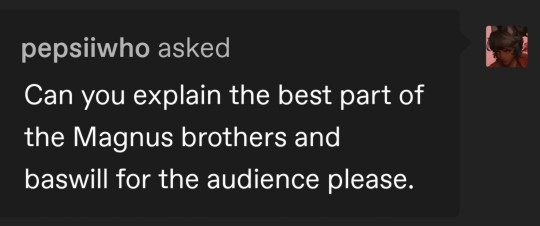
(My answer to this got rather long, @pepsiiwho , and felt like something that might start some interesting thinkjuice in the tag, so I'm making it its separate post.)
Hrmm. How to encompass all that we've been talking about for like a month now, about why Basilio/Will is compelling.....
To set the stage a little- there's a Metaphor Re Fantazio post I've seen making the rounds that says, to paraphrase: 'the universe of MRF is excellent for fanworks specifically because it is so vague.' I'm inclined to agree even though this is also a double edged sword; we are given little 'meat' on a lot of functions and lore of the overall setting, mere drips and drops of backstories and history, passing one-line mentions of otherwise fascinating topics never broached again..... we're shown just enough to hook us in and make us care, make us wonder, make us want to expand upon what little is given, and no more. It is frustrating, to be sure, but on the other hand, it allows for a LOT of wiggle room for fan creators to sort of just take the slack in the reins and run with it.
For me- and most others, I'd imagine- one appeal of shipping comes broadly from taking something not in canon (usually not even implied) and bringing it into existence. This is typically done by interpreting source material in alternative ways- certain lines can be thought of as more rosy than they are, some canon scenes that end early with a cut-to-black might in the imagination be extended and deepened, the way characters are animated to interact with each other might seem just so.... we know all that, I don't need to explain how we go about fueling the brainworms for pairings in general. What I WOULD like to submit to the class is that Basilio/Will in particular feels, to me, like something that is ripe with narrative opportunity, which makes it FUN both as a creator and a consumer.
Let me see if I can explain what I mean by 'narrative opportunity' and why it appeals to me (and probably others) from a fanwork creator's perspective. Humor me for a minute here.
Let's say you have characters A and B, set in a universe, and lalala the plot happens. A and B are not canon but are the perfect shipbait, are both very fleshed out, they each have defined personality traits and goals and nuances. The universe is also very well established and described. And finally, the PLOT is very well established. These three things are critical. It's a tight story all around: there's few to no loopholes in the timeline or pacing, the characters feel deep and deliberate, the events of [thing] happen in a very specific way/order the whole time. This is a good thing! This is how good stories are often told. When an audience is confused and frustrated and fed bullshit half-answers about a vague world and characters that are shallow or contradict themselves, it typically makes them care less about a subject because there's no cohesion, no common threads to follow. Excessive handwaving is annoying as fuck.
Typically.
I say typically, because sometimes.... sometimes, you end up with what MRF managed to pull off.
MRF has an overall plot which on its face it SEEMS cohesive- such and such happens, the cast goes here then here then here, they do this, the day is saved. It APPEARS to be a tidy story, if all you look at is on the surface. But if you dig into this IP, even a little, it falls the fuck apart. The timeline is a mess. Decisions/plans made are a mess. Some of the beloved characters are one dimensional or are a mess (using tropes or singular traits or hints of intriguing nuance that are never again touched on.) The worldbuilding is a mess. And as a writer, I HAVE to dig into these things. My entire craft is based upon my understanding of the source material, and in the case of MRF, the source material is just. Fucking. All over the place, holy shit.
That said.
It is... a fun mess. This is the most important part: it is a fun mess regardless. For all that MRF falls short in many ways, it is STILL charming and nuanced enough to overcome its abject sloppiness or total lack of concrete lore. It has "good bones", as our friend group jokes.
So back to the narrative opportunity thing.
I typed all that shit up there to contrast a theoretical 'tightly woven' linear storydriven IP to whatever the fuck MRF is, through the comparative lens of creating fanworks off of either piece.
For the tight IP, where everything is laid out and makes sense and things are more 'set in stone', I as a writer have less wiggle room to change things- I have less narrative opportunity. Sure sure, as a writer I can do "anything" as long as I'm good, but realistically.... if the original work did not leave me a shitload of loopholes to exploit, or vagueness of characters/history/lore/whatever, if I want these things tweaked to suit the point of my story, I have to do a lot of fucking legwork. It might not even be feasible. Again, this is not inherently bad- it's good, I'd argue. It means the story doesn't suck, it means thought and effort was put into worldbuilding by the creators.
However- with Metaphor Re Fantazio, there are plot holes in that motherfucker so big I can drive a gauntlet runner through them. This is my delicious narrative opportunity.
Because canon in MRF is already so handwaved and vague, if not outright contradictory- as a writer, I have a LOT of freedom to change or fix or completely negate things without it feeling nearly as 'disruptive' to an audience. Let me give a quick one: electricity. You can't recall if MRF uses electricity, can you? I'll save you the hassle- there is ONE undeniable instance of electricity being used. (Sea monster attack, a lightbulb above the table very explicitly shorts out and dies.)
This opens up so many more questions than it answers. Did Neuras alone discover electricty? Is it just not commonly adopted yet? Was it a fluke by the Atlus studio?
Therein is my narrative opportunity.
And that's just one small example. MRF is full of this open ended shit, ranging from the society, to the physical worldmap, to the food, to the clothes, to the tribes, to the history and religion and 'animals' and magla and prince and- you get the idea. The characters, notably, are not exempt either.
Circling back to the original question 800 tangents later, "what is the best part of the Magnus Brothers/BasWill": I personally like writing and reading Basilio/Will because of this narrative opportunity.
Basilio is incredibly fleshed out. He is, imo, an excellent character on all fronts. His visual design, VA, animations, backstory, interpersonal relationships..... it's genuinely a goldmine. For every one character trait or tidbit a main cast member has, he's got three.
By contrast, Will.... I'm gonna level with y'all here, I think Will sucks LMAO. The game does NOT give that guy more than the barest minimum nothingburger personality imaginable. Will doesn’t say more than a full sentence or single word answers for like half the damn game, and the utter wasteland of a personality for someone who SHOULD have a lot on the line, is... offputting, to me. However, there are still some facts to be gleaned from what little we're given: Will is calm, quiet, to the point, determined, and kind. Generally. Vaguely.
Once we recognize that Basilio as a character is more 'locked in' to believably behaving a certain way given his canon-established facts, whereas Will is NOT- that's where my narrative opportunity comes in. That's where my fun is.
Authors can, within reason, write Will SO MANY DIFFERENT WAYS because of this. He's very close to a blank slate, while still showing enough personality that sssssooome things you could still point at and go "uh yeah that feels pretty ooc" but it's much looser. As an author, this means I can bend him into a little pretzel to behave certain ways that suit the narrative of the story I'm telling at that time, and it won't be egregiously difficult to do so nor conflict with canon. As a reader, it means I get to experience other people's Wills and see what THEY wanted to get out of him! And it (probably) also will not feel OOC, even if it's very different from mine! And that is so, so fun.
That is my technical answer.
My personal answer, if we're angling more for a quick bulleted "what do you like about THEM though, Quill," list (keeping in mind this is all personal preference or things that at least captivate ME on some level): size/strength difference, lived experience difference, experiment trauma background, Basilio's accent and personality is fun, his depth of character both in tandem with and apart from his brother Fidelio, his sense of humor and group banter, he's got unique non-human features (humans bore me so much omg), and he's just... a good person. Him and Will are straight up just good people, and that checks a box for me. Boring or simple, perhaps, but I (personally) don't read fanfic to make myself sad and miserable with sad and miserable characters, so Basilio/Will having such massive narrative opportunity to be nice people is pleasing to me and the genres I tend to favor.
That same narrative opportunity in the hands of a good writer can easily extend, though, to making them petty, or reserved, or despondent, or angry, or any number of completely different takes. And again: therein lies much of the fun, because MRF makes it so so easy to twist canon with what it does not give us. It's all in the nuance babeeeeeey.
This is already long so I won't crowd it further with an analysis on the Magnus Brothers- and that would be best under a spoiler tag anyway. But suffice to say, in all regards, it is the depth of character that Basilio has and Will, contradictingly, does NOT have, that makes them fun to write, read, and ship.
16 notes
·
View notes
Text
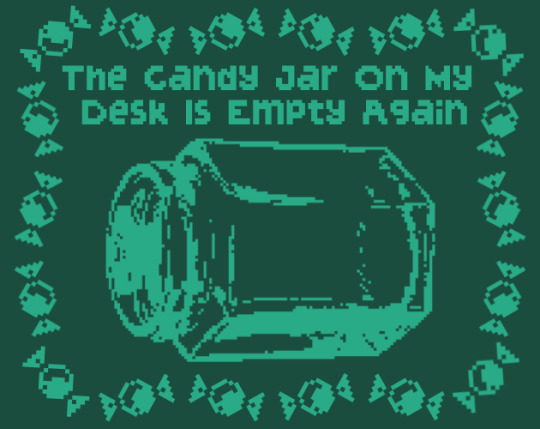
> Get the game as part of Indiepocalypse #63!
The candy jar on my desk is empty again, and that means something horrible is coming for me.
The Candy Jar On My Desk Is Empty Again is a short interactive fiction game with a confusing metaphor and 20 endings. It was commissioned for Indiepocalypse #63 (@pizzapranks) and is currently available exclusively by purchasing the bundle!
A post-mortem about the themes of the game can be read in the bundle's accompanying zine; you can sign up for the Indiepocalypse newsletter to get free versions of all the zines so far! A devlog is under the cut.
Conception
I was actually terrified to receive this commission lmao. It's been a while since I felt such acute imposter syndrome. (And a lot of negative, unexpected events happened shortly after I was asked to make this game, which did not help. But Andrew was very patient with me and I appreciate that!)
It did take me a while to decide what I was going to make. After one false start that I scrapped altogether, I knew I wanted the game to open on a ridiculous reality that it would then uphold as if it were a completely normal fact of life. This was partially inspired by people often telling me that they don't believe I am chronically ill because they don't think anyone can function under the conditions I describe. It was only partial inspiration, though. Mostly I just wanted to be silly.
Ah, yes, silliness. That was the original tone of the game, but it morphed quite quickly and became about themes I have personally struggled with as a person with an abusive childhood and mixed parentage. But more on that in the aforementioned post-mortem.
Art
Jungle green in a colour present throughout the game. It's the exact shade of green that confuses me the most (I have psychosomatic colour vision issues, related to DID), which is why I chose it. It's present in every single image in the game except the ending screens. Due to my interpretation of the colour, it was meant to be symbolic of trauma-based confusion that disappears, abates, or ceases to exist with the MC upon reaching an ending, but now that I'm typing that out, it sounds a little pretentious. That was my intention, though, so I'm standing by it.
Anyway, here are some shots from the game in its original base palette (jungle green + dark green + light pastel green). Some of these have different colour palettes in the final game, but the jungle green is always in them.
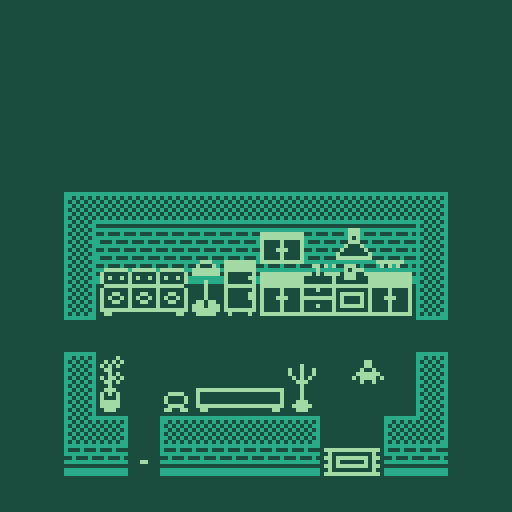

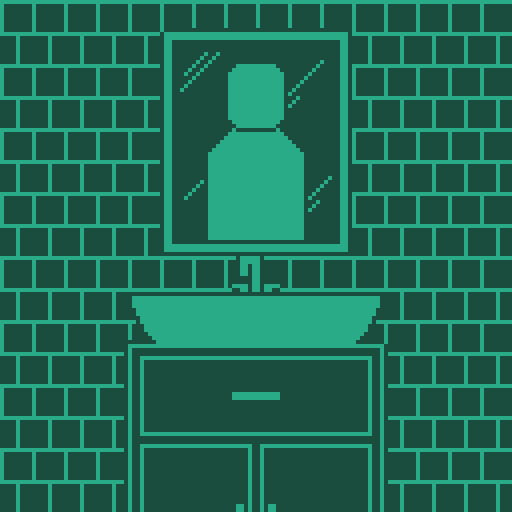
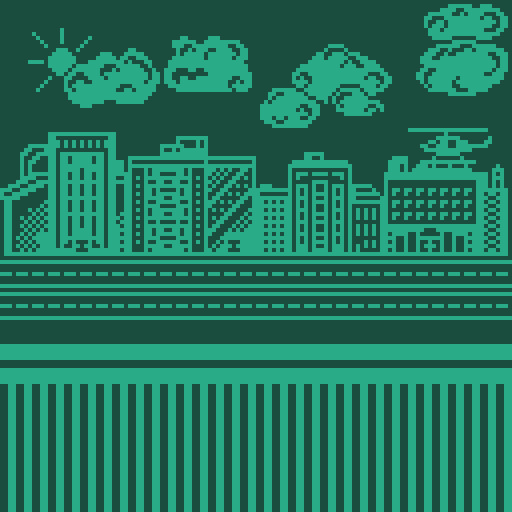
(...it would be so embarrassing if someone told me this isn't jungle green and I've been a fool this whole time. It would be oddly thematic, though.)
Writing and Coding
Unlike with most of my games, I wrote the narrative script as I was coding it (which I did outside of the bitsy engine website due to the additional hacks I was using), so it was morphing and shifting all the time. It was, in my mind, the only way to make the story have the weird, almost disjointed vibe and feel I wanted out of it. It also allowed the script to take me by surprise, in the way that sometimes creative works seem to write or otherwise make themselves.
The three primary game routes are 1) a completely narrative route with just text and changing images, 2) a route where you wander around with a sprite in a top-down map, and 3) a mix of the two. I actually made them in that order, but in the game itself they're arranged 2, 3, 1, which makes it look like I lost steam towards the end. I do regret that a little; if I could redo things, I would swap the choices around so it doesn't seem like I was rushing at the end.
Thankfully, I didn't struggle too much with the choice hack (thank you, borksy!); I made a short and silly bitsy game two months ago called The Hissing Booth with the hack so I could remind myself how it works, and it paid off.
I originally planned to add music to the game using bitsy's music feature, but I found that the chiptune sound kind of reduced the impact of some aspects of the game. Perhaps if I'd had more time (and fewer life things in the way), I would have made it work. For now, I'm at peace with the game's silence.
Thank you for reading this devlog! If you would like to play this game, you can get it as part of the Indiepocalypse #63 bundle. After the exclusivity period is over, you'll be able to get the game directly from my page, too! The accompanying readme contains content warnings for those who may need them.
10 notes
·
View notes
Text
Ito is not an evil murderer for no reason: a meta
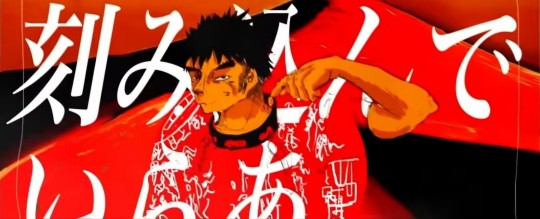

I'm going to be breaking down the lyrics and PVs of three songs: Yellow Papa (x), Dear Suns (x), and Flower War. This is a chronological look at Ito's story. Feel free to look them over if you need a review :3 the song is linked in the first word, and the lyrics in the second. I left a second translation for Yellow Papa and Dear Suns because I like the second one better for readability. Flower War has lyrics in the captions of the PV

Before I start: As I understand things, this series of songs by Abuse is centered around a cult that primarily idolizes indulgence to any degree. Especially through Ito and Zoy, we see sex and cannibalism heavily intertwined. For this reason, I interpret cannibalism to be both literal and a metaphor for rape
Ito himself is the oldest of four siblings. He is fully man himself, but serves as a parallel to Ote in that his mind is that of a beast while his body isn't. His mom is a beastman, and his absent father is a man
Yellow Papa
*Please note that Ito is described as "only just learning how to read" during this song, making him around five
The general point of this song (which I assume most people don't know as this is a song that was initially supposed to be Dear Suns, but Abuse cut and put on Abuse Bundle instead) is to illustrate Ito's childhood. Both this and Dear Suns seem to serve similar purposes, both coming out after Flower War to further humanize Ito. This song follows a parentified Ito and his siblings as Ito begs for love from their parents. So fun and chill ty Abuse
We see a lot of talk of meat and being eaten, as is standard with Ito ofc:
Most notably, the line "'Love us, love us!', My mother's fangs gobbled me up, and I became raw meat". Obviously Ito was not literally eaten here, which leads us to the conclusion that Ito's mom is sexually abusive
This leads straight into "That sort of sensation was of falling from the top", tying back to the opening line of "I ate the raw meat that had fallen from the top", meaning one of two things. Either we are meant to take the first verse's lines as autocannibalism, a metaphor for how he is having to take care of his siblings with their father absent; or we are getting our first glimpse at why Ito might be a cannibal: need. If this isn't meant to be taken as an analogy and Ito is eating "raw meat" (presumably people), this paints a picture of him and his family being in a dog-eat-dog kind of world, having to cannibalize other vulnerable people around them in order to eat
We also see his mother ask if he is going to eat her, which he says he is. This is touched on more in Dear Suns, obviously. He cites his reason for eating her as because his father doesn't love her. With the final chorus showing Ito more desperate for his father's love than food, which he and his family are very clearly lacking, it gives us the general themes of Ito as a character:
Love, sex (and sexual abuse), and eating are all one and the same to him
Dear Suns
*Ito is older here, he seems to be at least a teenager based on the illustrations, but there is no lyrical acknowledgement of his age
As I'm sure most people know, this is more insight into Ito as a character rather than any particular event in his life, outside of the detailing of him eating mother and siblings
To begin with though, we get some elaboration on Ito's life before this song and how he came to be at the church. At about 1:43, the PV reads, "one thousand necks have been severed, so many bodies remain, sever the necks of one thousand [millionares?], blood stains remain even in the shower stalls, I'm in the middle of the street, I spend a year in the hospital, I don't know my name, I don't know where I live, 'you are a child, and this is your new family'." This implies that somewhere in between Yellow Papa and this song, while Ito was still young, he was eventually taken in off the street and to a hospital where he lived for a year, the church taking him in as him "new family" afterwards. This is over the line in the song that reads "you must protect your family, carve it into your DNA," which points to the church directing him into the role he takes on in Flower War to at least some extent
At 1:04, we also see a shot of text that reads, "for the first time in my life, I have a purpose" right as soon as the chorus starts detailing Ito killing and eating people, yet another implication that this is something he took on as more of a job than a crime of passion
There's also a shot of him wearing a collar with a chained lead at 1:26, which is obvious enough a sign of being controlled, especially when all the characters are dog-based. There is an inherent dehumanization to all of the characters in this plotline of Abuse's, but it applies to Ito too, not just the beastmen characters. Despite being fully aware of his actions, he is collared, compared to an animal, and dehumanized by the narrative itself
This song especially is full of evidence that Ito was brought up in the church for the sole purpose of protecting the people in their cult. With several lines about "having to protect his family" and especially "protect your family and their connection to you, it's carved into the spiral/(alternate translation above)", it really makes it seem like he's more of a child soldier for them than just the common interpretation of him being a yandere type. There's also the mention of "xochimiquiztli"* which ties in more with Flower War (obviously more explaination later), meaning not only in Flower War but this song too, he is canonically compared to an honored soldier going on what is basically a suicide mission for the sake of pride and protection of their religion
And of course, the song closes with Ito saying "this is wrong". He's aware that he is commiting horrible acts on some level, yet he keeps doing it because he loves his family
*Refers to a death on the battlefield in a flower war. From the Aztec Empire, roughly translates to "flowery death"
Flower War
*Still no age for Ito, and he is pictured as a fox, so it is hard to gauge
To begin with, I'll give a brief summary of what flower wars are. In the 1450s, the Aztecs were going through a famine, and determined that the gods were angry and needed human sacrifices. In order to obtain these, soldiers were sent out into small, pre-arranged battles to take prisoners. Any deaths (or xochimiquiztli as before mentioned) were considered honorable, and the dead would join the god of sun, fire, and war.
This is tied to Ito's character as a whole. He grew up in the church because of growing up on the streets without food, he is heavily tied to sun imagery in Dear Suns and Flower War (while Zoy is notably tied to fire), and Flower War tells the story of his noble flowery death. In my opinion, this is too much connection to brush off as just reading into things. Ito is almost canonically called a child soldier through this analogy alone
This song really only follows Ito's last kill and his own death, which is a mission he goes on in order to kill people who "made fun of father (Zoy)" and "tried to kill Ote". The whole way he goes on about loving his family and his victims (again, love=sex=hunger to Ito), degrading himself, and praising his family members. He also mentions several times (2:06, 3:26, 4:01) that he is not supposed to kill children, which seems to be his undoing. While reminding himself of this rule, which he seems to only follow because someone else set it for him, he is shot and killed
In the final shot of the song, we also see a carnation that is red and yellow, the red meaning love (or specifically love for your mother, bc he has mommy issues ig) and the yellow representing disappointment and contempt. Like Dear Suns, this final moment displays some level of regret for his actions, and a final callback to his mother, who has now been mentioned in all three of his songs

In conclusion: my blorbo did nothing wrong /j please stop pointing out that he is a cannibal every time I mention liking him
#ito#yellow papa#dear suns#flower war#this is probably not everything because I think about him constantly#but these are the main points I think
18 notes
·
View notes
Text
inuyasha thoughts (thinking face
um im watching inuyasha and i love it so far, i havent gotten past episode 6 of season 2 and ive never read the manga so if anyone replies pls dont spoil lol
im just obsessed w/ kikyo and inuyasha's relationship and how effortless of an allegory it is for coming to terms with unhealthy love.
like, kikyo wants inuyasha to join her in death (join her in the metaphorical and literal place she remained after their last meeting)
kikyo lures inuyasha in repeatedly and tries to drag him with her to hell, i feel like the metaphor is so blatant here (toxic companionship dragging you down) (btw this scene was so crazy like i was seriously dying everywhere all over the place)
they were lovers who had a profound understanding of each other, albeit a bit flawed being that kikyo believed inuyasha’s path to happiness was by abandoning his demon side
she felt as though they couldn’t truly be together if inuyasha remained half demon. in one scene, kikyo remarks that SHE would’ve been the one to heal inuyasha’s heart had she stayed alive, however taking what i just described into account it seems her idea of helping inuyasha was a bit naive.
so like, in some ways kikyo is a very literal person.. yes, there is a selfish and hurt side of inuyasha that you can equate to his demonic attributes, but they will not subside simply by revoking his powers. if anything, much like how kikyo reviving herself wouldve caused the shikon jewel to corrupt, i would go as far as to say that maybe using the jewel to turn inuyasha into a human would have a similar effect
yes, they are soulmates, but the more kikyo forces her vessel to remain alive, the more she loses her essence & character… much like how in forcing something to remain afloat you start sacrificing key parts of yourself in the process,, the purpose of her existence at the moment is literally to "kill" inuyasha so they can "die" together .
oftentimes when you are acting from a position of pain .. u become completely stagnant... ur growth has to halt in order to make room for the agony you are inflicting upon urself.
u have no room to heal (or in this case let yourself die despite everything that happened).
which is insanely difficult in kikyo's case being that the circumstances of her death and what occurred afterwards was honestly just not fair at all. & sometimes life is like that..
anyways this concept of submerging yourself in negative thought loops charged by past wounds & becoming incapable of growth as a result is literally what kikyo embodies post-resurrection.
what i feel like isnt understood by kikyo, inuyasha OR kagome (for perfectly understandable reasons mind you) is that inuyasha really does end up making amends with kikyo…… i feel like kikyo doesnt see that her and kagome share the same soul.. she doesnt see how profound the love must’ve been to have literally led her reincarnation BACK to inuyasha…….. like kagome is right in front of her and she doesn't really think to consider this, again because she is so caught up in the past
(there are multiple mentions of "wishing time to stop" when kikyo and inuyasha first reunite)
like….. do u understand……. how wild that is.. they loved each other so much that time betrayed itself …..
continuing on with this allegory tho, i think it’s also really neat that at least on a surface level the events that led to kikyo’s revival were kind of uncontrollable, like, some other old lady wanted kikyo alive for her own interests.
in a way i feel like you can see this as a performance of reconciliation, and the pain that comes alongside it . kikyo is a ghost of a past that inuyasha must face and come to terms with , and the only way to do that is to see what lies beyond her..
yes , to him it felt like the first time he really felt remorse and love for another person in that kind of way,,, but to return to kikyo despite her not even being alive anymore, it's almost like pretending it will be the LAST time as well.
which, it's not! love is not created or destroyed! you simply learn of its existence and its omnipresence! you simply learn how to love even more!
theres literally a scene in the anime where he is under a spell, he is holding kikyo , promising to protect her, and all of a sudden… in FRONT of him… kagome appears.. he is then reminded that he has to protect kagome as well.
at the end of the day, when kikyo was alive, she chose to join inuyasha in his (supposed) eternal sleep… i see this as a profound act of faith in him and in their love... i love kikyo because the side of her she shows after her death is so human and cruel and real. and she was a symbol of unwavering strength for her village, yes, but as she herself said kikyo was also simply a person. simply a woman endowed with an immense responsibility.
it is a shame that she wasn't able to grow comfortable with vulnerability alongside inuyasha in her life, but her soul's wish was fulfilled at the end of the day... instead of seeing that, rejoicing, and letting go of her body, she latches onto all of the restless souls she can and finds any way to satiate her egoic desires. which is literally so #real lol
it isn’t even about kikyo’s love or kagome’s love or inuyasha’s love per se, just that the very force that is love will persevere and reveal itself from within one’s own being… this act of revelation and what follows can be very beautiful and very heartbreaking, there is no one smooth way to engage with it …
with the ceasing of kikyo’s life came a new form of the very same love that existed within inuyasha and kikyo and kagome and everyone ever in the world.,,, it will always follow u if ur ready…… thats what i think... those two are also a story about finding love again despite "dying" the last time...
it’s just so fucking cool this is the best love story ive ever seen lol......... omfg
2 notes
·
View notes
Text
a lot of the 'shifts' and divergences from canon that occur on this blog (as well as a few focus-points in terms of traumatic experiences), in regards to eragon, revolve around one specific event - the agaetí blödhren. in general, i think there was a lot of missed and scrapped potential within the inheritance cycle, but it is the agaetí blödhren that completely changes the trajectory of the story in terms of eragon's character and how he must interact with the world and exist within it.
the agaetí blödhren, or 'the blood oath ceremony' in english, is an elven celebration that occurs every 100 years, commemorating the pact forged between elves and dragons as a means to end the long-standing dragon war (aka, du fyrn skulblaka). it was through this pact that the souls of elves and dragons were brought together as one, and it was when the elves were given their immortality, and the dragons, their magic and ability to communicate. the event itself, which occurs once every hundred years and for three days straight, is described as being so visceral and raw and dangerously intoxicating (and exceptionally unwise for non-elves to experience, as, if i remember correctly, they run the risk of being lost in the ensuing spiritual mania and snapping mentally under what is essentially an overdose of magic), as the elves chant and sing their magic for the entirety of those three days. an excerpt from eldest, the gift of dragons:
Then the elves began to sing in their clear, flutelike voices. They sang many songs, yet each was but part of a larger melody that wove an enchantment over the dreamy night, heightening senses, removing inhibitions, and burnishing the revels with fey magic. Their verses concerned heroic deeds and quests by ship and horse to forgotten lands and the sorrow of lost beauty. The throbbing music enveloped Eragon, and he felt a wild abandon take hold of him, a desire to run free of his life and dance through elven glades forever more. Beside him, Saphira hummed along with the tune, her glazed eyes lidded halfway.
What transpired afterward, Eragon was never able to adequately recall. It was as if he had a fever and faded in and out of consciousness. He could remember certain incidents with vivid clarity—bright, pungent flashes filled with merriment—but it was beyond him to reconstruct the order in which they occurred. He lost track of whether it was day or night, for no matter the time, dusk seemed to pervade the forest. Nor could he ever say if he had slumbered, or needed sleep, during the celebration.…
suffice to say, the night itself is a strange one for eragon, a wave of new and bizarre experiences. but it is less the agaetí blödhren itself that changes eragon - i will always stand by the idea that even without what happens with the dragon-tattoo, the ceremony was, in some fashion, traumatic for eragon, or at the very least a not so great time for him, and though it's definitely something he himself tells himself he has no opinion on, his experience wasn't exactly the greatest - and moreso the violation of autonomy that occurs during.
for context, for the last several months up until this point, eragon has suffered from seizures, which have gotten progressively worse and more frequent and life-threatening as the days have gone on. this is a result of being gored on the sword of durza, a shade 'employed' by galbatorix. the seizures themselves spark as a result of the extreme pain and agony that eragon's wound / scar leaves him in, as well as, in my own opinion, the metaphorical mental scarification of eragon's brain being split between two places (fighting for his own consciousness as well as being trapped in the remnants of durza's memories / mind), and the subsequent struggle to actually bring himself back fully and stay present, even if he's out of that place and belongs to himself again.
with all of that being said - during the agaetí blödhren, there is a moment where an elf's dragon tattoo separates from their body amidst the magic-song of the celebration, and it approaches eragon and touches his gedwëy ignasia, his dragon-mark. in this moment, eragon has no idea what is happening or what will happen to him; he technically can't even be classified as sober, and is, as paolini himself describes, drifting in and out of being black-out, and solidly and detrimentally disoriented. he does not know what the dragon-tattoo will do to him, and neither does anyone else present. and herein lies an odd decision on paolini's part.
when the dragon-tattoo touches eragon's gedwëy ignasia, it triggers a physiological and magical response in eragon, who immediately blacks out as a result of the searing pain that shoots all throughout him, and he is understandably terrified out of his mind as to what's happening to him. excerpt from eldest, the gift of dragons (still):
As the dragon’s baleful eye fell upon him, Eragon knew that the creature was no mere apparition but a conscious being bound and sustained by magic. Saphira and Glaedr’s humming grew ever louder until it blocked all other sound from Eragon’s ears. Above, the specter of their race looped down over the elves, brushing them with an insubstantial wing. It came to a stop before Eragon, engulfing him in an endless, whirling gaze. Bidden by some instinct, Eragon raised his right hand, his palm tingling.
In his mind echoed a voice of fire: Our gift so you may do what you must.
The dragon bent his neck and, with his snout, touched the heart of Eragon’s gedwëy ignasia. A spark jumped between them, and Eragon went rigid as incandescent heat poured through his body, consuming his insides. His vision flashed red and black, and the scar on his back burned as if branded. Fleeing to safety, he fell deep within himself, where darkness grasped him and he had not the strength to resist it.
Last, he again heard the voice of fire say, Our gift to you.
when eragon awakes an hour later, he is completely and utterly changed. when it comes to dragon-riders, due to the pact forged between elves and dragons, and the fact that it was elves who made the first bond with dragons [to create dragon-riders], as they age, human dragon-riders will slowly become more physically elven; an unavoidable thing, a result of the magic which courses through them. however, in this situation, the process has been heavily expedited, and eragon finds himself … near completely elven.
he also finds that he has no scars anymore. no seizures. he is also the pinnacle of beauty, and has been made to have alabaster skin. as it stands, while having such drastic physical changes forced upon him is a traumatic incident for eragon, it is the latter issues that i will not be fully acknowledging, mostly in part because i do not … really enjoy the way in which eragon's blemishes and disability were completely erased, and become things of the past for him. especially in the case of his disability.
the way in which paolini has a tendency to write disabilities is a very unforgiving one. those who are not abled-bodied in some way, shape, or form, are outcast, isolated, and deemed worthless, weak, and generally repulsive. now, this whole thing could have been made into a commentary on how that way of thinking is, in fact, cruel, and that particular lack of compassion and the upholding of 'perfection' and 'normality' [in regards to being able-bodied], but if i'm being entirely honest, you can really tell how old paolini was when he wrote this story when disabilities, physical and mental, are the topic of discussion, and you can definitely tell the era / year the books were written in. even more unsavory, there is the full discussion and implication of eugenics regarding those who are not able-bodied within the story, and virtually every single character seems to be entirely on board and in agreement about the worth and abilities of those who are disabled. it's not exactly the prettiest picture that gets painted, here.
to have eragon magically 'cured' of his seizures, and for the every single character and the story itself sigh a breath of relief, because eragon 'would have been useless' had he not been 'fixed' (which, if i remember correctly, 'fix' was, in fact, a word that was used when speaking about eragon and his disability). it is entirely true that continuing to deal with his seizures would be a struggle, and he would be put through the wringer, and as someone who is disabled himself, i know the feeling of 'i would do anything to not have to feel like this / go through this ever again'. but the way that paolini pretty immediately 'fixes' the problem, and the way that the the story and its cast treat eragon as though he is suddenly useless and incapable of anything after his battle with durza, is honestly more than a little uncomfortable and in extreme poor taste. the idea that life as a whole is an impossible obstacle if you cannot function 'normally', and the persistent ideology that you are weak and useless and incapable of achieving anything if you are not able-bodied is, in fact, a shitty mindset to have, and takes away a lot of the weight that could be applied to your story, were the protagonist allowed to be disabled and still be a hero.
now, the other thing that rubs me the wrong way about eragon's transformation and how he is described, is the prevalent note regarding him now having 'alabaster skin'. while eragon himself has not, up until this point, had his skin-tone described at all, something that has been common place within the writing itself for almost all characters (which, given the fact that it's only the characters of color who ever get described, we can assume that paolini intends for every other character to be white, and for us to just assume and expect that). however, and this is likely just a result of the way that i've read and interpreted the story, but regardless - despite eragon's lack of description wrt skin tone, he has always, in my mind, been brown, which in part is because … and my memory is constantly foggy and i cannot find the exact passage i'm thinking of, but i believe there have been notes made regarding brom (eragon's biological father) and the fact that he would conceal his gedwëy ignasia with mud and clay, which in and of itself does not prove that brom was brown in any way, but it's the idea that no other characters seemed to take notice of that or think anything of it (and the subsequent concept that the mud/clay might have blended relatively well with the rest of his skin). this whole point has a lot less confidence than the one above, i admit, and is more speculation and headcanoning than written-fact, but eragon suddenly being pale as snow and that being one of the identifying traits that makes him beautiful now … it does feel a little bit weird.
now, as i cannot figure out a transition to this point and want to get this post over with before i lose my mind, how i will be portraying eragon on this blog where the agaetí blödhren and his transformation are concerned:
as stated previously, eragon still has seizures. they are not as extreme as they were when he was in the height of his physical agony as a result of his wound, but he still has them from time to time, with the worst episodes typically occurring in moments of high stress as well as, predictably, moments of extreme physical pain. his particular symptoms include temporary disorientation (speaking gibberish / incoherently without realizing, saying the same thing(s) over and over for a second as if 'glitching'), zoning out (staring into space, 'not listening'; extremely brief, does not remember whatever is said / done during these little hiccups), and, less frequently, fainting / blacking out (there have, in fact, been a few instances of him 'passing out' at his desk, or having to sit down on the ground because of a 'dizzy spell'; can last a few minutes, and he usually comes to extremely disoriented and exhausted and out of it). he is still a capable and dangerous fighter, and is far from helpless. he does get frustrated with himself at times, but he is not useless by any measure of the word, and still has the full capacity for adventure and heroics.
many of his smaller and 'less important' scars were healed during his transformation, but not all of them. the scar that durza left, as well as his scars from his first flight with saphira, and the one that he gave himself when messing with garrow's scythe, still mark his body. durza's scar still hurts, but not to the intensity that it did before.
brom and eragon are brown. the transformation does not change this.
9 notes
·
View notes
Text
Sorting thoughts:
The countdown list:
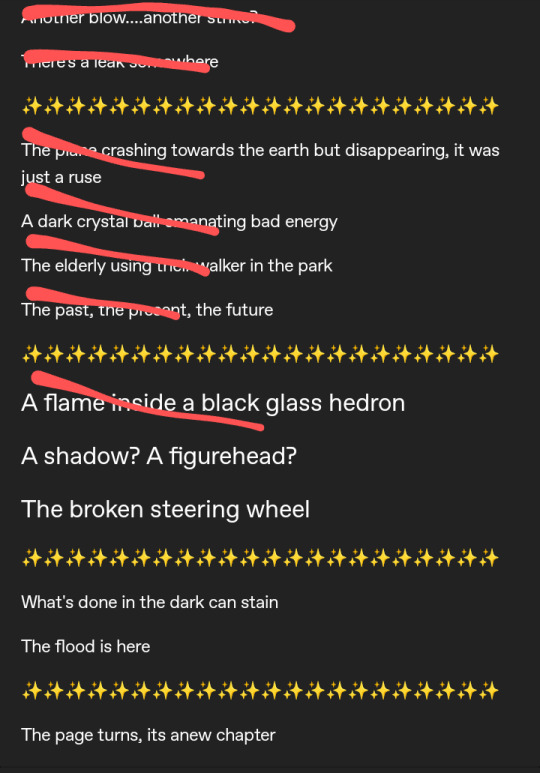
This fucking hedron is pissing me off
Ok so Dream 1# concluded with the discovery of the graves under the Hospital, which means the other two dreams are still in play.....🤦♀️
Museum Date and the Haitian Woman from the original triad are still playing out, is this the real measure of the countdown I keep feeling?
Complete dream list post:
The Chris dream makes sense in my brain to current context but it may be hard for others to follow....it's all happening at once, which means the Haitian woman dream is playing out at the same time as well
I've always thought the third dream to be related to the US elections, however if you consider the events of South Africa going to the ICC into account it also fits....(Ugh layers) if you think about the overall struggle right now it is basically a fight against colonialism and white supremacy - which also fits
Which I guess means there are layers to the Museum dream as well ugh are they events? We just had the Met Gala? But are the events in the dream the order in which they actually occur? Or is it a list to cross off? This would make sense given a post by Kamala got crossed off as one of the events in the third dream, well symbolically anyway...
(Why can't I just have dreams about my neighbours or some shit? I mean I recently realised the empathic side of what I've been absorbing literally from my neighbours and people around me? Why on earth would the other side bother little old me with world event notes? Like what could I actually achieve?)
Anyway back to todays list:
Eye of the storm approaching? The clock is ticking faster now an increase in wind speed? A flame flickering, Stars falling? An egg cracking
One possible set of events? Again, I worry about the layers, theres always 3,
Eye of the storm approaching?
Why does it present itself as a question though? The eye of the storm/a tilted axis/fork in the path: the centre point from which all things come?
The sun? How close do we come before being burned? It makes me think of the solar storm but while real time events can offer a sign I get more of a Hurricane feeling, which I guess means its at its halfway point, which I guess makes the end of this immediate scenario next January, I'll have to look up events for Jan 2025
(I honestly apologise for the constant metaphors but I challenge you to describe the feeling looking at your favourite colour gives you)
The clock is ticking faster now an increase in wind speed
There is technically an actual ticking clock in the Museum dream attached to a bomb, I rescue the useless twat wearing a moon boot and help him dodge other fake explosions, the debunking of the PR BS maybe?
It makes me wonder about this hurricane feeling, the second half of the storm apparently passes faster than the first, so when it ends it ends at hyperspeed? Ironic they got "married" in a massive storm
Ok layers: time is running out, not just for the CE situation but in the other ones as well. Things are speeding up on both sides the clock is ticking and people are literally aware, the increase in windspeed things happening so fast now its like watching the world go by in fast forward, things aren't going to plan, its like watching a weathervane flip back and forth changing directions
A flame flickering, Stars falling?
*sighs* theres that eternal flame again, *shrugs* I mean solar storm, would it technically be considered flickering? Lol
I have to admit it has crossed my mind how that storm might really mess with some of the older satellites, if one of them falls into the Ocean off the coast of NZ I'm claiming it
It could be what is basically a digital vigil for Palestine, the strength of the flame struggling but refusing to go out, passing of a torch to the newest generation perhaps, keeping the flame alive? Gen Z currently holding the line?
Stars falling, could be funky satellites, could be missiles, could be the flags of the US/UK/Israel? The Blockout2024, the fall of Hollywood Celebs who refused to speak up and pay the price?
An egg cracking
It's the same life/death/rebirth cycle of change?
But what's being hatched? A new plan? A new Path?
Or are we just stuck here looking at Humpty Dumpty after his great fall
Does it mean the facade cracking?
All of the above?
Ugh layers
Back to the Countdown list one more time before I go:
That whole Hedron section is Karmic ☯️
But it's also an end? An end date?
Dark and light, push and pull, a debt owed a debt paid
But a choice only one can make
(ugh this is some chosen one shit isn't it?)
#angels predictions#fireangelsdreams#angelstardust#chris evans pr#palestine#us elections#kamala harris
3 notes
·
View notes
Text
Breaking up sentence length is good, not just for dialogue but for writing in general. Quite apart from ease of reading, there's more visual appeal as well. Few things are more off-putting to a modern reader* than a solid paragraph of unbroken text.
(* "Modern" includes me at Uni in the late 1970s, confronted by the blocks of text in Classic Novels like "Tristram Shandy" and "Tom Jones" - and my eyes were a lot better then than now...)
Regarding dialogue tags: "said" is NOT dead, and never was.
What it is, is almost invisible, and my usual metaphor is this:
Dialogue is a picture on the wall, the dialogue tag is its hook. Which one should attract most attention?
The more extravagant and obvious the hook, the more it distracts from the picture. Using an extravagant hook should happen only rarely and enhance the dialogue in the process.
@sparrow-and-seed-scrawls shows how well-thought-out dialogue can proceed effectively and coherently for quite a distance without even needing "said".
As long as the readers are aware of who's speaking there's no need for "said-Jack-said-Rose-said-Jack-said-Rose" to remind them, and as those examples demonstrate, character actions and emotions can intensify the exchange even more.
Don't ignore dialogue tags entirely, though. Just don't get carried away because, if you can stand another metaphor:
Dialogue tags are seasoning, completely unseasoned food is bland, but over-seasoned food is overwhelming and hard to swallow, yet can also be monotonous.
That's because over-use of over-elaborate dialogue tags can be like writing in CAPS LOCK. When everything's already loud and emphatic, what's left to show emphasis? CAPS ITALIC? CAPS BOLD? CAPS ITALIC BOLD?
Don't assume something is a good tag just because it's in a "said is dead" list like this one.
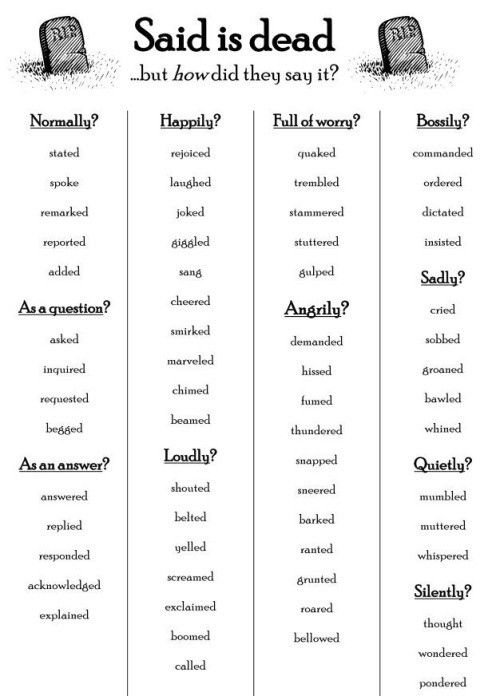
Think about your alternative tag. Can you hear its effect on the dialogue? If not, or if you have to work at it, then maybe that's not such a good choice after all.
What does, for instance, "rejoiced" as a way of speaking actually SOUND like?
Wouldn't the character rejoice a bit more obviously by leaving off any dialogue tag and describing their expression, body language and reason for rejoicing instead? If the result's too long,it can always be cut, but description shows, while an awkward dialogue tag can only tell - and sometimes it can't do even that.
"She is rather wonderful," Sinclair owned. "I have heard her described as one of the most efficient women in the whole of London." "The Moorcroft Manor Mystery", © 1935, Ralph Trevor
Owned?
"Agreed", "admitted" or "conceded" at least suggest something about what the character thinks of his subject, but "owned" almost certainly came off an "alternatives-to-said" list, or maybe even a wheel like one of these.
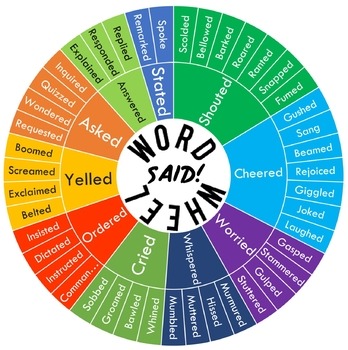
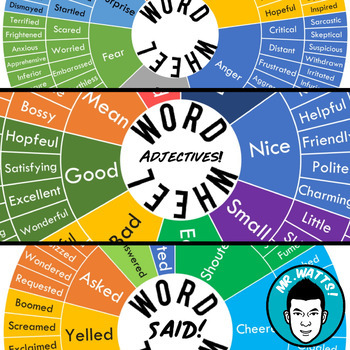
Nowadays they're teaching aids. Back then they were "writers' helpers", sold from small newspaper ads, all yours for a stamped self-addressed envelope and a one-shilling postal order.
Side-note: there were / are also plot wheels, with Exciting Events or Complications. Here's a modern one.
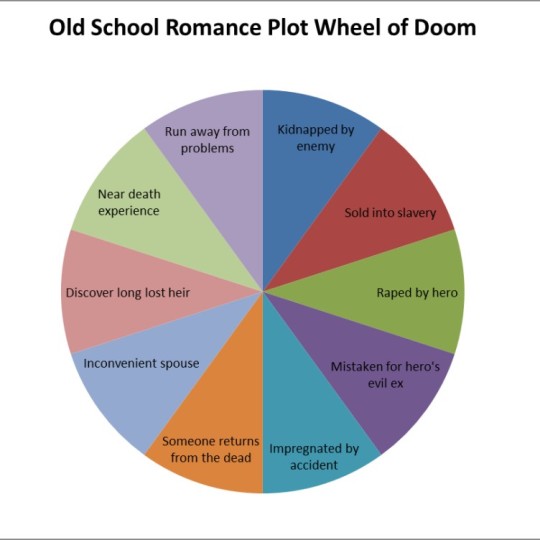
Erle Stanley Gardner (supposedly) used at least four during the course of writing 119 "Perry Mason" novels. Those known are:
Wheel Of Hostile Minor Characters Whose Function Is Making Complications For The Hero.
Wheel Of Complicating Circumstances.
Wheel of Blind Trails By Which The Hero Is Misled or Confused.
Wheel of Solution.
I could only find a photo of (3), and his handwriting is not of the best...

...but the site where I found it also had the transcribed entries from each one.
That, however, is for another post.
ETA: It's Here.
The British version was (again, supposedly) created by famous thriller writer Edgar Wallace, who churned out books at such a rate that it's claimed he once dictated an entire novel over a weekend. Another apocryphal story says that an acquaintance phoned him, was told "Edgar's writing a novel" and replied, "All right, I'll hold till he's done."
Like most of his contemporaries Wallace is almost forgotten now, but in his day he was famous (and prolific) enough to prompt this cartoon.

*****
"Something not mentioned," he added humorously, "is the dialogue adverb."
That's an -ly word tacked onto the end of a dialogue tag in hopes it will do the work not actually done by the dialogue itself. There was nothing funny about that sentence, and the adverb didn't make it so. The same applies to far too many adverbs in dialogue - either they're not needed because the dialogue is clear enough, or they're a waste of space because they're having no effect.
No amount of "said humorously" will make an unfunny piece of dialogue funny, but it will definitely point out where the lazy writer who should have written funny dialogue decided that sticking on a misleading label would suffice.
Where such adverbs work rather better is as contrast.
If an action already has a built-in meaning - "laughed" suggests happiness - then adding "happily" is unnecessary. However "sadly" or "grimly" or some other opposite immediately prompts the question "why?", which in turn prompts further reading to learn the answer.
And further reading is just what writers want readers to do. :->
How to Write Strong Dialogue
(from a writer of ten years)
So you’re back in the writing trenches. You’re staring at your computer, or your phone, or your tablet, or your journal, and trying not to lose your mind. Because what comes after the first quotation mark? Nothing feels good.
Don’t worry, friend. I’m your friendly tumblr writing guide and I’m here to help you climb out of the pit of writing despair.
I’ve created a character specifically for this exercise. His name is Amos Alejandro III, but for now we’ll just call him Amos. He’s a thirty-something construction worker with a cat who hates him, and he’s just found out he has to go on a quest across the world to save his mother’s diner.
1.) Consider the Attitude and Characteristics of Your Character
One of the biggest struggles writers face when writing dialogue is keeping characters’ dialogue “in-character”.
You’re probably thinking, “but Sparrow, I’m the creator! None of the dialogue I write can be out of character because they’re my original characters!”
WRONG. (I’m hitting the very loud ‘incorrect’ buzzer in your head right now).
Yes, you created your characters. But you created them with specific characteristics and attitudes. For example, Amos lives alone, doesn’t enjoy talking too much, and isn’t a very scholarly person. So he’s probably not going to say something like “I suggest that we pursue the path of least resistance for this upcoming quest.” He’d most likely say, “I mean, I think the easiest route is pretty self-explanatory.”
Another example is a six-year-old girl saying, “Hi, Mr. Ice Cream Man, do you have chocolate sundaes?” instead of “Hewwo, Ice Cweam Man— Chocowate Sundaes?”
Please don’t put ‘w’s in the middle of your dialogue unless you have a very good and very specific reason. I will cry.
Yes, the girl is young, but she’s not going to talk like that. Most children know how to ask questions correctly, and the ‘w’ sound, while sometimes found in a young child’s speech, does not need to be written out. Children are human.
So, consider the attitude, characteristics, and age of your character when writing dialogue!
2.) Break Up Dialogue Length
If I’m reading a novel and I see an entire page of dialogue without any breaks, I’m sobbing. You’re not a 17th century author with endless punctuation. You’re in the 21st century and people don’t read in the same way they used to.
Break up your dialogue. Use long sentences. Use one word. Use commas, use paragraph breaks. Show a character throwing a chair out a window in between sentences.
For example:
“So, you’re telling me the only way to save my Ma’s diner is to travel across five different continents, find the only remaining secret receipt card, and bring it back before she goes out of business? She didn’t have any other copies? Do I have to leave my cat behind?”
vs.
Amos ran a hand over his face. “So, you’re telling me the only way to save my Ma’s diner is to travel across five different continents, find the only remaining secret recipe card, and bring it back before she goes out of business?”
He couldn’t believe his luck. That was sarcastic, of course. This was ironically horrible.
“She didn’t have any other copies?” He leaned forward over the table and frowned. “Do I have to leave my cat behind?”
The second version is easier to digest, and I got to add some fun description of thought and action into the scene! Readers get a taste of Amos’ character in the second scene, whereas in the first scene they only got what felt like a million words of dialogue.
3.) Don’t Overuse Dialogue Tags.
DON’T OVERUSE DIALOGUE TAGS. DON’T. DON’T DON’T DON’T.
If you don’t know what a dialogue tag is, it’s a word after a sentence of dialogue that attributes that dialogue to a specific character.
For example:
“Orange juice and chicken ramen are good,” he said.
‘Said’ functions as the dialogue tag in this sentence.
Dialogue tags are good. You don’t want to completely avoid them. (I used to pride myself on how I could write stories without any dialogue tags. Don’t do that.) Readers need to know who’s speaking. But overusing them, or overusing weird or unique tags, should be avoided.
Examples:
“I’m gonna have to close my diner,” Amos’ mother said.
“Why?” Amos growled. “It’s been in the family forever.”
“I’ve lost the secret recipe card, and I can’t keep the diner open without it!” she cried.
“The Bacon Burger Extreme recipe card?” Amos questioned.
“Yes!” Amos’ mother screamed.
“Well, that’s not good,” Amos complained.
vs.
“I’m gonna have to close my diner,” Amos’ mother said, taking her son’s hand and leading him over to one of the old, grease-stained tabletops with the ripped-fabric booths.
Amos simply stared at her as they moved. “Why? It’s been in the family forever.”
“I’ve—” she looked away for a moment, then took in a breath. “I’ve lost the secret recipe card. And I can’t keep the diner open without it.”
“The Bacon Burger Extreme recipe card?”
“Yes!” She still wouldn’t meet his eyes, and her shoulders were shaking. “Yes.”
Amos sat down heavily in the booth. “Well, that’s not good.”
The first scene only gives character names and dialogue tags. There are no actions and no descriptions. The second scene, however, gives these things. It gives the reader descriptions of the diner, the characters’ actions, and attitudes. Overusing dialogue tags gets boring fast, so add interest into your writing!
So! When you’re writing, consider the attitude of your character, vary dialogue length, and don’t overuse dialogue tags.
Now climb out of the pit of writing despair. Pick up your pen or computer. And write some good dialogue!
Best,
Sparrow
6K notes
·
View notes
Text
Mushrunes and Mycellogos
The Druidic language is square, derived from bark carvings. The first order is called Seed, a square ideogram. The second order is called Bark, a 2x2 grid of ideograms, four seeds. The third order is called Stone, a 2x2 grid of Barks, sixteen seeds. Further orders are called Bolder and Cave, 64 and 256. The names come from the type of place where the symbols are normally inscribed. Seed, Bark, Stone, Boulder, Cave. Each one is larger and more permanent than the last, more suited for a larger text. The Druidic language is almost entirely used to record information about plants, animals, places, and events. Seed can name a type of plant; vegetable, briar, grass, grain. Bark can name a specific plant: redberry, hovelbush, gloambriar. Stone can describe the traits of that plant: partial sun, dry, with good drainage, seeds spread by fruit. Boulder can describe its history and uses: domesticated long ago, jam and jelly, easy to harvest and process, slow-growing, valuable if protected for many years. Cave can describe its poetic and magical qualities: support and sustenance, survival, prosperity-while-poor, homeliness, nostalgia, reason, earthiness, sweetness, hardiness, nourishment. There are rumors of a final order, Cavern, which can describe the total nature of a plant, including its great mysteries, but no Cavern texts have ever been discovered.
The Mushroom People and their neighbors are often fluent in the Mushroom Language, which is derived from Druid Runes. While Druid Runes are always square, Mushroom Runes (Mushrunes) can append runes to the corners, budding off in multiple directions, telling rambling stories. This multi-linear language forms branching rambles. It's difficult to interpret and understand, because it's often metaphorical or abstract. Meanwhile, most of the Mushroom Folk do not know Imperial Common, or refuse to speak it. They are usually friendly and generous, though poor, but they do not induct strangers into their mysteries. They teach their language willingly, but do not lead strangers to their Rune Caves.
Each Rune Cave describes at least one key plant, animal, event, or place in full detail (256 ideograms). Finding that cave, theoretically, would grant one significant knowledge of magical and poetic mysteries. The square text is usually engraved in ancient Druid Runes and painted in a single color, often luminous gold. Mushrunes bud from this Druidic text, spiraling off fractally in every direction, forming trails that lead throughout the cave. Usually they are painted with a different color, especially green. As they grow more distant from the central text, they may become more disparate and less organized. Thus, a single rune near the entrance of the cave may signify its importance and lead the way to the mystery at its center. Indeed, Mushrunes often serve as signposts throughout the Underlands, forming a network of paths known as the Mycellogos. The Shroomfolk claim that understanding their language doesn't help one navigate the Mycellogos. Rather, personal knowledge of the local area creates a connection between place-names and paths, just as the grid-like structure of the Druid Runes gives relational meaning to individual ideograms. In a way, the language itself is synonymous with the topology of the land, because the location of a word inflects its meaning and the meaning, in return, transforms the land.
0 notes
Text
"So why do Leviathan and Behemoth exist? Was God required to create them somehow?
"This goes back to the problem of evil."
"It is important to remember that the Book of Job is explicitly a story; not a historical event (God did not allow Job’s children to be killed just to “win a bet” as it were; Job and his children are fictional). It is a divinely inspired meditation on the nature of suffering unjustly.
Leviathan and Behemoth are similarly not real beings created by God. They are metaphors for primordial chaos and destruction.
More accurately they represent the ABSENCE of God’s peaceable order and protection.
That point is key, because just like Evil and Death, they are not created things; they are absence (though the term is also used to describe an event that causes the absense); evil is the absence of rightly ordered good and death is the absence of life.
"Many stories like to personify evil (many mistakenly make this The Devil, but while he chooses to perform acts devoid of God’s goodness, he was created by God to be good and so is not, in fact, pure evil… no creation of God can be completely absent of His goodness, but his immortal pride just makes him hate and deny that aspect of himself even more) and/or death and to make it not just a created thing, but a created person. But they are only so in stories.
"So too are Leviathan and Behemoth personifications of the absence of God’s order in a story about Man’s relationship with God and their experience of harmful events.
"To sum it up, Leviathan and Behemoth exist because a divinely inspired Jewish author chose to present the absence of God’s order in Creation as personified beings (probably because the concept of all Creation being entirely a construct of God’s sustained will; that if He ever ceased to will our existence Creation would become nothingness; is a pretty abstract concept for the average person to grasp, but a mighty warrior fighting a beast seeking to consume us is something easily visualized)."
0 notes
Note
For the get to know your fic writer asks, 13, 27, 47, 55, and/or 62? However many you want to answer
For Get To Know Your Fic Writer Asks
Hihihihihi I'm so sorry for having taken so long. I had an incredibly rough two weeks and I barely am getting back into gear. I hope this isn't upsetting to you.
13. what’s a common writing tip that you almost always follow?
Create a time skeleton!
Okay, that sounded like I'm gonna do some weird necromancy. No, that's what my literature professor called drafting charts. Basically, know what order you'll want your main events to happen in. I usually go with timelines in the following format:
[Year, *month/season]: [Event/Action] of/by [Name of character].
*optional, usually in the case of several important events happening in the same year.
I highlight the names a different colour each. Also, if this is not set in a long term story, I replace the first part of the format by "beat 1/beat 2/beat 3/etc"
27. What is your most and least favorite part of writing?
I loooove writing dialogue! I also really like describing in very flowery ways what someone is like or feelings. I grew up surrounded by metaphors and comparisons to explain abstract and firm concepts, so it's really fun to do that.
The main issue I have with writing as a whole is connecting scenes. I hate it so muuuuch! Why can't I just give you disjointed bits and bobs and you fill in the voids? Because that's mean and also The Vision doesn't come out right.
47. How many times do you usually revise your fic/chapter before posting?
Every. Single. Time. I open that document it's revision time. I just keep reading and revising as I go. It helps me get into it and as I revise I start continuing where I left off. That works for me!
55. Of the characters you write for, which is your favorite? Has that choice been swayed at all by your followers/readers’ reactions to certain ones?
My main dears are obviously Gerry and Michael. Equally. I don't think that's changed (unless you count the many weeks I got harassed and threatened for liking the ship that left me in a really bad anxious state where I was even scared to like the characters individually, especially Michael). Next is Eric, because I love a good dad, and a handsome older man as is my right being a little over a decade old resident in the sexualising-that-old-man website. Jon is um... He's fun, but I'm not gonna recommend what I've written, just in case. You look at the age ratings and tags on those by yourself, buds.
I used to write for other fandoms and enjoyed writing for specific characters a lot, but most of my English fic has either been orphaned or deleted because I cringe about those wips that I used to have in my old computer. My style has definitely changed after joining TMA. It was way more US-white-fangirl-catering and the fandoms have been horrid beyond reparation. So, it doesn't sit right with me anymore to keep them. I know there exists some ancient fics in Spanish for stuff none of you would ever recognise and I'm just patting baby-me's back and smiling awkwardly while mumbling "that's so cute, buddy! Great job" even though I don't like it anymore. Don't kill your inner child's work, that kid worked their ass off on that keyboard back in the day and made masterpieces for their age, it's worth celebrating (tho sometimes from afar).
62. Thoughts on cliffhangers?
Darling, I write fanfiction. One of the main reasons fanfic writers write is cliffhangers. We carry the torch!
But in more concrete answers: I struggle with writing cliffhangers myself because I feel a deep need to finish all my stories (yes, I haven't abandoned any of them in this fandom. I'm just struggling and get distracted), but I do enjoy reading them every once in a while. If it's good food, you don't refuse it.
0 notes
Text
Unit 06
"There is no peculiar merit in ancient things, but there is merit in integrity, and integrity entails the keeping together of the parts of any whole, and if these parts are scattered throughout time, then the maintenance of integrity entails a knowledge, a memory, of ancient things. …. To think, feel or act as though the past is done with, is equivalent to believing that a railway station through which our train has just passed, only existed for as long as our train was in it."
Edward Hyams provides an engaging reflection the relationship between past and present. This quote above describes that even although something may be ancient, it does that mean that his has value. He defines integrity as "the keeping together of the parts of any whole,". This implies that real integrity has to mean more than just holding on to parts of history. Integrity involves maintaining a flow throught past to present , which is what he means by the"whole". Since this "whole" being discussed are "scattered through time,", everything in our lives including our way of life are constructed by past experiences. In order to keep this integrity, it's important to stay connected to our experiences from the past and present and remeber our origins.
The train station metaphor that Hyams uses underlines how pointless it can be by holding on too much to the past. Just because the train leaves the station does not mean the train station doesn't exist anymore, just like how just because whatever has happened in the past is not happening anymore does not mean that it never happened. Wether people admit it or not, our past shapes who we are. To dismiss it as "done with" or over with makes people lose touch of the bigger picture, which shapes present and future events.
All in all, the author urges people to gain a better understanding on how all periods of time are connected to one another. In this quote, past and present are not singular moments in time, rather they are one connected story. The old is valuable because it is part of the back story of what is the new. With this, he underlines the need to approach our hisotry not so much as nostalgia but more to remember it, glorify it, and teach that it is a part of us because it has gone through generations.
0 notes